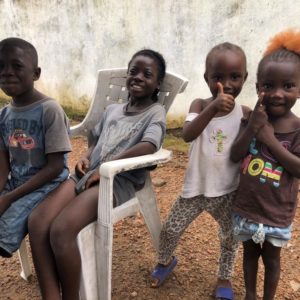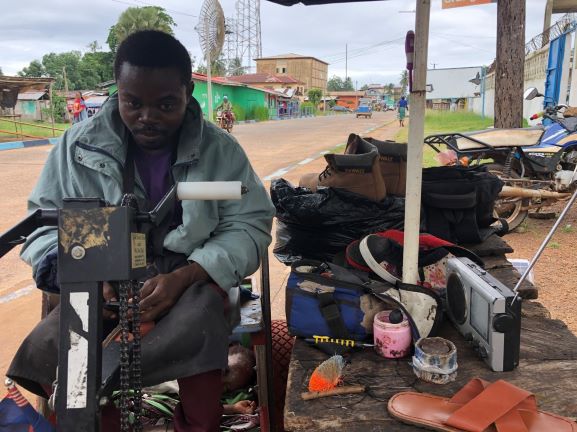PHOTO: Jerry Laffa, a 35 year old shoes maker in Grand Bassa Co. (Image used with permission)
BY Elton W. Tiah
Catering for just a child in Liberia nowadays is a serious problem for able-bodied people let alone with people with disabilities in Liberia.
Jerry Laffa, who is also physically challenged and is only able to access places by means of a wheelchair, is a young Liberian disabled man who is making a living as a cobbler in Liberia’s southern port city of Buchanan, Grand Bassa County, which is more than 193 kilometers from Monrovia.
With no empowerment from external sources, Jerry had previously been involved in shoe repairing activities along the Robert Street near the National Social Security Corporation (NASSCORP) and the Liberia Bank for Development and Investment (LBDI). His business spot that is just a stone throw away from the offices of the County Superintendent Office and the County Service Center.
Taking into consideration the child’s feeding, clothing, health and most of all, the child’s schooling, one would sit and think how to go about achieving it when in fact the country economic has gone bad.
Jerry Laffa is one person who has such a problem on his head.
He has a family of six that he is catering to on a daily basis; as father of four children including his wife, they rest their problems on at his feet for a solution.
A graduate of the Christian High School in Buchanan, Jerry could not continue his academic studies at the Grand Bassa Community College due to lack of access to the Buildings and its location, which is a 20-minute drive from the Buchanan main Street.
Article 24 of the Convention on the Rights of Persons with Disabilities regarding EDUCATION which emphasized that: “States Parties recognize the right of persons with disabilities to education, With a view to realizing this right without discrimination and on the basis of equal opportunity States Parties shall ensure an inclusive education system at all levels and lifelong learning directed to.”
What Jerry is doing for survival
Unlike others living with disabilities who wake up early seeking for handouts from others, Jerry Laffa decide to do the other way around; he wakes up each day and makes his way at a place he repairs shoes for people.
He charges a customer depending on the work done on a pair of shoes or other materials taken to him for repairs.
Funds collected through his self-help initiative, he is able to provide daily feeding, settle hospital bills, and other items needed to keep his family up.
With the current situation that even poses challenge for able-bodied persons who cannot afford to cater to his family, Jerry said in a recent interview that he could not withhold his happiness about how God is continuously blessing his life through shoe repairing.
“As head of disabled youths in Grand Bassa, I want to encourage my colleagues to find something to do to sustain their family. I feel that anyone can keep their family up by doing something,” he says.
He furthered: “If a man like me can repair shoes to keep my family up, any other person can do the same.”

Jerry Laffa’s four Kids (image used with permission)
A graduate of the Liberia Christian High School in Grand Bassa he enrolled, Jerry enrolled at the Grand Bassa Community College with the intent of studying Information Technology (IT). But this dream of furthering his education might not become a reality due to what he called ‘hash conditions.’
According to him, he turned to repairing shoes after he observed that the Grand Bassa Community College was not disabled friendly and he had to keep his family up.
“I am a father of four children and so I been managing to keep my family alive through different means. I firstly started with study class and later started repairing shoes to keep my family up,” he said.
“I really don’t want to be shoes repairer, but I also don’t want to become a beggar to feed my children and so I had no option but to become a shoe repairer.”
Laffa mentioned that since he started repairing shoes, God has been good to him and he has been able to cater to his family through that means.
“I am a young man and I don’t think shoe repairing is the best thing for me to do as an educated person, but as a physically challenged youth with kids , I have to plan the future of my children by doing something to keep them up,” he said in a rather sad mood.
Although he is not happy turning into shoemaker, but he at the same time does not want for society to see him as a worthless person who does nothing to cater to his family.
“I am repairing shoes because I want my colleagues to follow my footstep and stop begging people in the street,” he said.
Stressing that disability is not inability, Jerry added that people living with disabilities can contribute to the society in so many ways.
He told this Reporter that he gets down-hearted, whenever he moves around the streets and see his fellow persons with disabilities “begging and people looking down upon them”.
“Look, I want many of my colleagues to see me as an example and find something to do instead of thinking that disability is inability,” he said.
For Jerry, he personally doesn’t feel disappointed about the condition that he finds himself in.
“I am always happy with my life because God is so great to me,” Jerry said in an upbeat tone.
In Addition, this physically challenged but self-motivated young Liberian asserts: “I am not working, but the little shoes I am repairing is a help to me and that it why I want my colleagues to stop begging and find something to do like me.”
Jerry, the 38-year-old physically challenged Liberian said that the situation was not enough to discourage him and send him on the streets to beg. “I decided to continue applying the Shoes making skills I acquired while in the village decades ago because begging can make me shame,” he tells this Reporter
Now, Youth Chairman of the Disabled Union in Grand Bassa County, Jerry tells his story about parental and friends’ abandonment, suggesting that similar situation faced by him could be part of the fundamental factors responsible for PwDs seeking handout by some Persons with Disabilities at street corners.
Despite low income, Jerry shoulders his monthly rent payment as tenant through saving portion of his daily income. This is a responsibility he said is regularly upheld in order to avoid lawsuit, because physically people are not above the law.
Article 6 of Liberia’s 1986 Constitution says: “The Republic shall, because of the vital role assigned to the individual citizen under this Constitution for the social, economic, and political well-being of Liberia; provide equal access to educational opportunities and facilities for all citizens to the extent of available resources.”
“Emphasis shall be placed on the mass education of the Liberian people and the elimination of illiteracy,” he stressed.
More and more, the life of Jerry Laffa is becoming a motivation for several youths in in Buchanan, in particular and Grand Bassa County in general. Many here say, if Jerry Laffa who is physically challenged can think of life in the positive way, they, too can do same. Publication of this article was made possible with support from Internews Liberia Inclusive Media Project.

